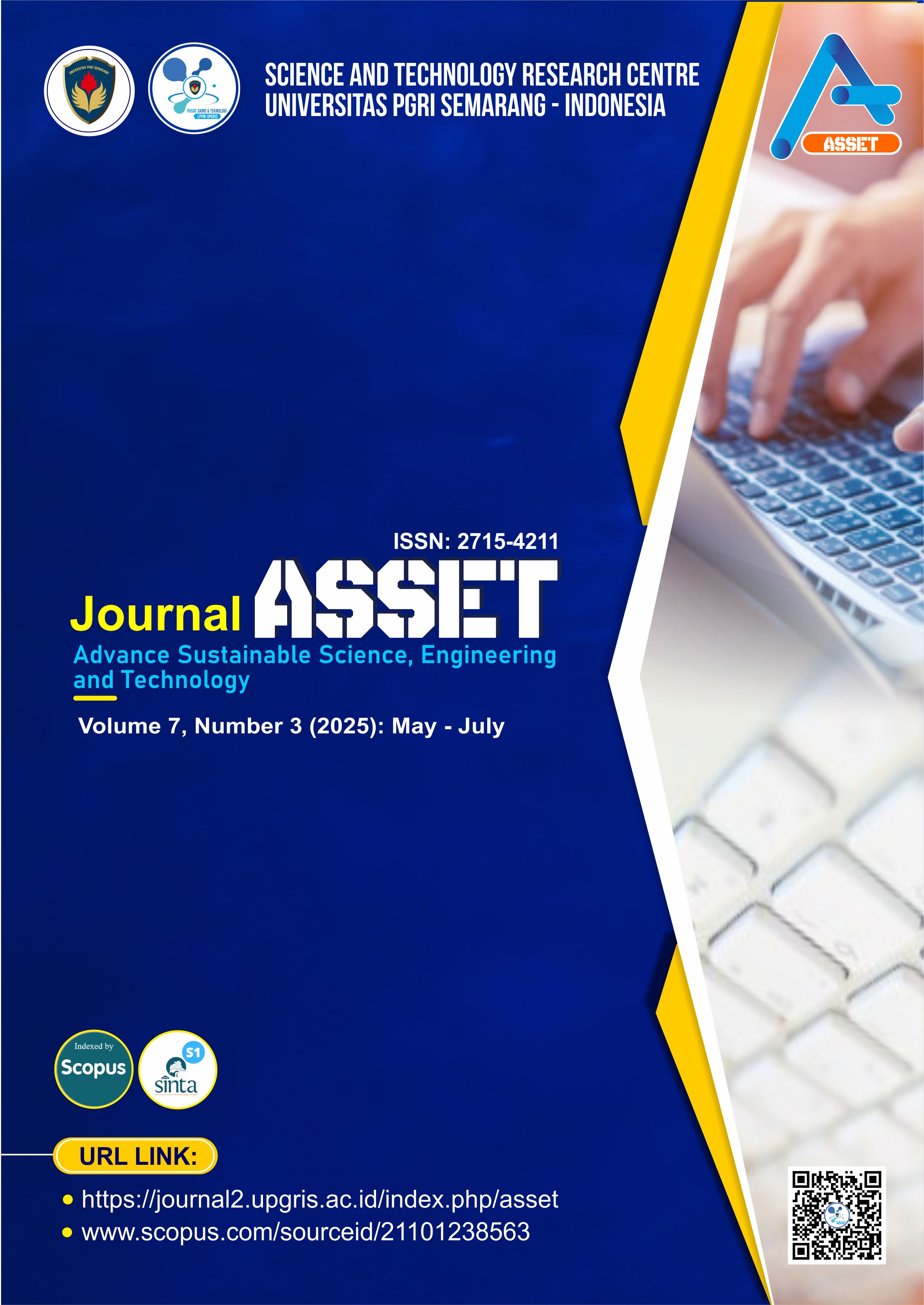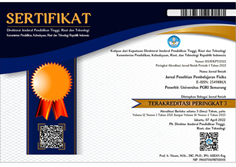Smart Hospitality and Innovation: The Role of Leadership, Local Wisdom, and Technology Integration in Five-Star Hotels
DOI:
https://doi.org/10.26877/asset.v7i4.2462Keywords:
Transformational Leadership, Paras Paros Citizenship Behavior, Technology Adoption Commitment, Technology-Enabled Innovative Behavior, Smart HospitalityAbstract
Innovative work behavior is a key driver of technology-based service innovation in the hospitality industry. This study integrates innovative work behavior into Technology-Enabled Innovative Behavior and reconceptualizes organizational commitment into Technology Adoption Commitment to capture employees' psychological attachment to technology adoption underexplored area. Commitment to capture employees’ psychological attachment to adopting technologies. This study aims to examine and analyze the influence of transformational leadership on Technology-Enabled Innovative Behavior, and through the mediating roles of paras-paros citizenship behavior and Technology Adoption Commitment. Using survey data from 377 employees of five-star hotels in Bali analyzed with PLS-SEM, the results show that transformational leadership significantly enhances Technology-Enabled Innovative Behavior, with Paras Paros Citizenship Behavior as a partial mediator, while Technology Adoption Commitment has no mediating effect. Higher Technology-Enabled Innovative Behavior is reflected in the frequent use of Property Management Systems, digital payment, and mobile check-in, whereas lower use of AI-driven customer service indicates areas for further innovation. The findings highlight that leadership and Paras Paros Citizenship Behavior provide strong cultural support, but innovation outcomes depend on the accessibility and integration of specific technologies. Strengthening leadership practices, local wisdom values, and the operational integration of underutilized tools can accelerate digital transformation in the hospitality industry.
References
[1] C. L. Chang, M. McAleer, and V. Ramos, “A Charter for Sustainable Tourism after COVID-19,” Sustainability, vol. 12, no. 9. 2020. doi: 10.3390/su12093671.
[2] T. Doğru, S. McGinley, and W. G. Kim, “The Effect of Hotel Investments on Employment in the Tourism, Leisure and Hospitality Industries,” Int. J. Contemp. Hosp. Manag., vol. 32, no. 5, pp. 1941–1965, 2020, doi: 10.1108/ijchm-11-2019-0913.
[3] N. Hua, A. Huang, M. Medeiros, and A. DeFranco, “The moderating effect of operator type: the impact of information technology (IT) expenditures on hotels’ operating performance,” Int. J. Contemp. Hosp. Manag., vol. 32, no. 8, pp. 2519–2541, Jun. 2020, doi: 10.1108/IJCHM-09-2019-0753.
[4] H. Ruël and E. Njoku, “AI Redefining the Hospitality Industry,” J. Tour. Futur., vol. 7, no. 1, pp. 53–66, 2020, doi: 10.1108/jtf-03-2020-0032.
[5] U. Gretzel, M. Sigala, Z. Xiang, and C. Koo, “Smart tourism: foundations and developments,” Electron. Mark., vol. 25, no. 3, pp. 179–188, 2015, doi: 10.1007/s12525-015-0196-8.
[6] V. B. Ferreira, B. Mataloto, J. Carlos, and A. Ferreira, “The Impact of IoT- Enabled Energy Management Systems on Hotel Operating Costs and Sustainability Outcomes,” pp. 32–35, 2024, doi: 10.17758/eirai20.f0324120.
[7] M. Farrukh, N. Y. Ansari, A. Raza, F. Meng, and H. Wang, “High-performance work practices do much, but H.E.R.O does more: an empirical investigation of employees’ innovative behavior from the hospitality industry,” Eur. J. Innov. Manag., vol. 25, no. 3, pp. 791–812, 2022, doi: 10.1108/EJIM-11-2020-0448.
[8] Q. Lin, “Transformational leadership and innovative work behavior: The role of identification, voice and innovation climate,” Int. J. Hosp. Manag., vol. 113, p. 103521, 2023, doi: 10.1016/j.ijhm.2023.103521.
[9] J. Tian, “Does Technological Innovation Have an Impact on Employment in the Hospitality Industry?,” Int. J. Contemp. Hosp. Manag., vol. 36, no. 4, pp. 1025–1043, 2023, doi: 10.1108/ijchm-03-2022-0370.
[10] P. Poba‐Nzaou, M. Galani, S. Uwizeyemungu, and A. Cerić, “The Impacts of Artificial Intelligence (AI) on Jobs: An Industry Perspective,” Strateg. Hr Rev., vol. 20, no. 2, pp. 60–65, 2021, doi: 10.1108/shr-01-2021-0003.
[11] M. Alajmi, “The Impact of Digital Leadership on Teachers’ Technology Integration During the COVID-19 Pandemic in Kuwait,” Int. J. Educ. Res., vol. 112, p. 101928, 2022, doi: 10.1016/j.ijer.2022.101928.
[12] D. Acemoğlu and P. Restrepo, “Robots and Jobs: Evidence From US Labor Markets,” J. Polit. Econ., vol. 128, no. 6, pp. 2188–2244, 2020, doi: 10.1086/705716.
[13] R. S. Dhaliwal and P. Misra, “Employability Skills Needed in Hospitality Industry: A Scopious Review,” Asian J. Educ. Soc. Stud., pp. 18–34, 2020, doi: 10.9734/ajess/2020/v10i130258.
[14] S. Adeyinka-Ojo, S. Lee, S. K. Abdullah, and J. Teo, “Hospitality and tourism education in an emerging digital economy,” Worldw. Hosp. Tour. Themes, vol. 12, no. 2, pp. 113–125, 2020, doi: 10.1108/WHATT-12-2019-0075.
[15] H. S. ud din Khan, P. Li, M. S. Chughtai, M. T. Mushtaq, and X. Zeng, “The role of knowledge sharing and creative self-efficacy on the self-leadership and innovative work behavior relationship,” J. Innov. Knowl., vol. 8, no. 4, p. 100441, 2023, doi: 10.1016/j.jik.2023.100441.
[16] N. N. Suliati, Noermijati, A. Sudiro, and D. T. Kurniawati, “Transformational Leadership and Innovative Work Behavior: The Sequential Mediating Role of Knowledge Sharing and Creative Self-Efficacy,” Probl. Perspect. Manag., vol. 23, no. 3, pp. 358–371, 2025, doi: 10.21511/ppm.23(3).2025.26.
[17] H. Abdallah and G. Ahmed, “The Influence of Innovation-Based Human Resource Management Practices on Employees’ Service Innovative Behavior in the Hotel Industry Context.,” Int. J. Tour. Archaeol. Hosp., vol. 3, no. 2, pp. 0–0, 2023, doi: 10.21608/ijtah.2023.186455.1051.
[18] A. H. S. Putro and J. L. Lee, “Analysis of longshore drift patterns on the littoral system of nusa dua beach in bali, indonesia,” J. Mar. Sci. Eng., vol. 8, no. 10, pp. 1–19, 2020, doi: 10.3390/jmse8100749.
[19] R. Bahagia, R. Daulay, N. Arianty, and R. Astuti, “Transformational leadership, emotional intelligence, and innovative work behavior: Mediating roles of knowledge sharing at public hospitals in Indonesia,” Probl. Perspect. Manag., vol. 22, no. 1, pp. 103–114, 2024, doi: 10.21511/ppm.22(1).2024.10.
[20] K. Jun and J. Lee, “Transformational Leadership and Followers’ Innovative Behavior: Roles of Commitment to Change and Organizational Support for Creativity,” Behav. Sci. (Basel)., vol. 13, no. 4, 2023, doi: 10.3390/bs13040320.
[21] M. Rizki, R. D. Parashakti, and L. Saragih, “The effect of transformational leadership and organizational culture towards employees’ innovative behaviour and performance,” Int. J. Econ. Bus. Adm., vol. 7, no. 1, pp. 227–239, 2019, doi: 10.35808/ijeba/208.
[22] U. Udin, R. Dananjoyo, and I. Isalman, “Transactional Leadership and Innovative Work Behavior: Testing the Mediation Role of Knowledge Sharing in Distribution Market,” J. Distrib. Sci., vol. 20, no. 1, pp. 41–53, 2022, doi: 10.15722/jds.20.01.202201.41.
[23] J. K. Gurmani, N. U. Khan, M. Khalique, M. Yasir, A. Obaid, and N. A. A. Sabri, “Do environmental transformational leadership predicts organizational citizenship behavior towards environment in hospitality industry: Using structural equation modelling approach,” Sustain., vol. 13, no. 10, 2021, doi: 10.3390/su13105594.
[24] Jufrizen, S. Farisi, Muslih, and M. Sari, “Transformational leadership and organizational citizenship behavior: Mediating role of affective commitment and work engagement of hotel employees in Indonesia,” Probl. Perspect. Manag., vol. 21, no. 4, pp. 1–12, 2023, doi: 10.21511/ppm.21(4).2023.01.
[25] M. Yuan, W. Cai, X. Gao, and J. Fu, “How Servant Leadership Leads to Employees’ Customer-Oriented Behavior in the Service Industry? A Dual-Mechanism Model,” Int. J. Environ. Res. Public Health, vol. 17, p. 2296, Mar. 2020, doi: 10.3390/ijerph17072296.
[26] A. E. E. Sobaih, A. M. Hasanein, M. M. Aliedan, and H. S. Abdallah, “The impact of transactional and transformational leadership on employee intention to stay in deluxe hotels: Mediating role of organisational commitment,” Tour. Hosp. Res., vol. 22, no. 3, pp. 257–270, 2022, doi: 10.1177/1467358420972156.
[27] W. Jiatong, Z. Wang, M. Alam, M. Murad, F. Gul, and S. A. Gill, “The Impact of Transformational Leadership on Affective Organizational Commitment and Job Performance: The Mediating Role of Employee Engagement,” Front. Psychol., vol. 13, no. April, pp. 1–12, 2022, doi: 10.3389/fpsyg.2022.831060.
[28] M. M. Naqshbandi, S. K. Garib Singh, and P. Ma, “The link between organisational citizenship behaviours and open innovation: A case of Malaysian high-tech sector,” IIMB Manag. Rev., vol. 28, no. 4, pp. 200–211, 2016, doi: 10.1016/j.iimb.2016.08.008.
[29] P. Khaola and D. Coldwell, “Explaining how leadership and justice influence employee innovative behaviours,” Eur. J. Innov. Manag., vol. 22, no. 1, pp. 193–212, 2019, doi: 10.1108/EJIM-08-2017-0103.
[30] A. Sudha, S. M. F. Azam, and J. Tham, “Transformational leadership and job performance of Maldives Civil Service employees, mediated by organisational commitment,” Int. J. Public Sect. Manag., vol. 36, no. 3, pp. 271–287, 2023, doi: 10.1108/IJPSM-09-2022-0198.
[31] M. Mustafa, M. Hughes, and H. M. Ramos, “Middle-Managers’ Innovative Behavior: The Roles of Psychological Empowerment and Personal Initiative,” Int. J. Hum. Resour. Manag., 2022, doi: 10.1080/09585192.2022.2126946.
[32] Y. Tang, Y. F. Shao, and Y. J. Chen, “Assessing the Mediation Mechanism of Job Satisfaction and Organizational Commitment on Innovative Behavior: The Perspective of Psychological Capital,” Front. Psychol., vol. 10, no. December, pp. 1–12, 2019, doi: 10.3389/fpsyg.2019.02699.
[33] P. M. Blau, Exchange and power in social life. Wiley, 1964. doi: https://doi.org/10.4324/9780203792643.
[34] A. Bandura, “Self-efficacy: Toward a unifying theory of behavioral change.,” Psychological Review, vol. 84, no. 2. American Psychological Association, US, pp. 191–215, 1977. doi: 10.1037/0033-295X.84.2.191.
[35] S. G. Scott and R. A. Bruce, “Determinants of Innovative Behavior: a Path Model of Individual Innovation in The Workplace,” Acad. Manag. J., vol. 37, pp. 580–607, 1994, [Online]. Available: https://api.semanticscholar.org/CorpusID:144237028
[36] R. V Krejcie and D. W. Morgan, “Determining Sample Size for Research Activities,” Educ. Psychol. Meas., vol. 30, no. 3, pp. 607–610, Sep. 1970, doi: 10.1177/001316447003000308.
[37] B. J. Bass, B. M., & Avolio, “Multifactor leadership questionnaire: MLQ; manual and sampler set.,” Mind Gard., 2004.
[38] N. N. Suliati, I. K. S. Sapta, I. W. Sujana, and A. A. D. Widnyani, “Organizational Commitment: The Mediator for Work Motivation and Organizational Climate Toward Organizational Citizenship Behavior (OCB),” J. Apl. Bisnis dan Manaj., vol. 8, no. 3, pp. 779–792, 2022, doi: 10.17358/jabm.8.3.779.
[39] M. R. Lynn, “Determination and quantification of content validity.,” Nursing Research, vol. 35, no. 6. Lippincott Williams & Wilkins, US, pp. 382–385, 1986. doi: 10.1097/00006199-198611000-00017.
[40] S. Sharif, K. Tongkachok, M. F. Haffidz Akbar, K. Iqbal, and R. N. Lodhi, “Transformational Leadership and Innovative Work Behavior in Three-Star Hotels: Mediating Role of Leader-Member Exchange, Knowledge Sharing and Voice Behavior,” Vine J. Inf. Knowl. Manag. Syst., 2021, doi: 10.1108/vjikms-07-2021-0122.
[41] E. Pelit and E. Katircioglu, “Investigating the Effects of Epistemic Curiosity on Innovative Work Behaviour: a Study on Hotel Employees,” Tour. Hosp. Manag., vol. 29, no. 1, pp. 73–85, 2023, doi: 10.20867/thm.29.1.6.
[42] Ja-Shen Chen, Hung Tai Tsou, and Astrid Ya-Hui Huang, “Service Delivery Innovation: Antecedents and Impact on Firm Performance,” J. Serv. Res., vol. 12, no. 1, pp. 36–55, Jun. 2009, doi: 10.1177/1094670509338619.
[43] M. Sarstedt, F. Hair, J, J. Risher, J, J. Hwa, C, B. Becker, M, and M. Ringle, C, “When to use and how to report the results of PLS-SEM,” Eur. Bus. Rev., vol. 31, no. 1, pp. 2–24, Jan. 2019, doi: 10.1108/EBR-11-2018-0203.
[44] J. F. Hair, G. T. Hult, C. Ringle, and M. Sarstedt, A Primer on Partial Least Squares Structural Equation Modeling (PLS-SEM) - Joseph F. Hair, Jr., G. Tomas M. Hult, Christian Ringle, Marko Sarstedt. 2017.
[45] L. Sürücü, A. Maşlakci, and H. Şeşen, “The influence of transformational leadership on employees’ innovative behaviour in the hospitality industry: The mediating role of leader member exchange,” Tourism, vol. 69, no. 1, pp. 19–31, 2021, doi: 10.37741/T.69.1.2.
[46] P. Khaola and P. Rambe, “The effects of transformational leadership on organisational citizenship behaviour: the role of organisational justice and affective commitment,” Manag. Res. Rev., vol. 44, no. 3, pp. 381–398, 2021, doi: 10.1108/MRR-07-2019-0323.
[47] E. M. Azila-Gbettor, “Transformational leadership and customer OCB: The mediating role of job involvement among Ghanaian budget family hotel employees,” J. Hum. Resour. Hosp. Tour., vol. 22, no. 1, pp. 120–142, 2023, doi: 10.1080/15332845.2023.2127051.
[48] T. Metaferia, Z. Baraki, and B. Mebratu, “Link between transformational leadership and teachers organizational commitment in Addis Ababa government secondary schools,” Cogent Educ., vol. 10, no. 1, 2023, doi: 10.1080/2331186X.2023.2187563.
[49] M. Pulido-Martos, L. Gartzia, J. M. Augusto-Landa, and E. Lopez-Zafra, “Transformational leadership and emotional intelligence: allies in the development of organizational affective commitment from a multilevel perspective and time-lagged data,” Rev. Manag. Sci., vol. 18, no. 8, pp. 2229–2253, 2024, doi: 10.1007/s11846-023-00684-3.
[50] N. Srivastava et al., “Recent advances on lignocellulosic bioresources and their valorization in biofuels production: Challenges and viability assessment,” Environ. Technol. Innov., vol. 29, p. 103037, 2023, doi: 10.1016/j.eti.2023.103037.
[51] B. N. Vuong, H. Tushar, and S. F. A. Hossain, “The effect of social support on job performance through organizational commitment and innovative work behavior: does innovative climate matter?,” Asia-Pacific J. Bus. Adm., vol. ahead-of-p, no. ahead-of-print, Jan. 2022, doi: 10.1108/APJBA-06-2021-0256.











